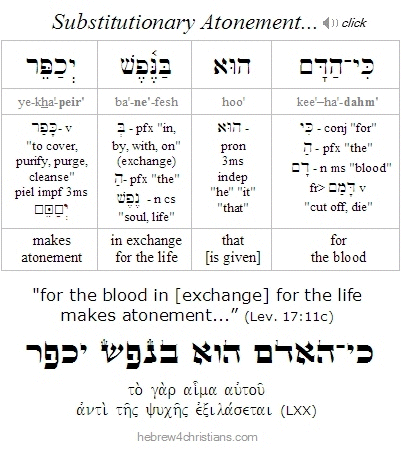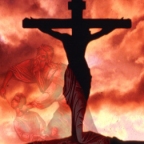|
Recently I was asked what I thought of those Jewish rabbis who deny that Yeshua the Messiah could have died for our sins because: 1) the Torah forbade human sacrifice, and 2) God would never allow an innocent man to stand in the place of a guilty one. Let's take a minute to think this through...
In response, let me first state first that when such people refer to the "Torah" in this matter, they are actually referring to the subset of the Torah called Sefer Ha-Brit (ūĪųĄūżųČū© ūöųĘūæų╝ų░ū©ų┤ūÖū¬) that defined the various ethical, social, and ritual obligations given in the Sinai Covenant (Exod. 24:7-8) and not to the Torah as a whole... Indeed, claiming that the whole Torah may be reduced to the terms of the Sinai Covenant is an example of the logical "fallacy of composition," that is, inferring that something must be true of the whole from the fact that it is true of some part of the whole.... We must remember that the Torah is something more than the code of laws and ritual obligations expressed in the terms of the Sinai Covenant (ūæų╝ų░ū©ų┤ūÖū¬ ūĪų┤ūÖūĀųĘūÖ), since the Hebrew word Torah (ū¬ų╝ūĢų╣ū©ųĖūö) is a general term meaning "direction," "teaching," "will of God," and so on. As we shalll see, the whole "Torah of Moses" contains far more than the covenant made at Sinai, as important as that part is.
For instance, the Torah reveals that the very first "priest" (i.e., kohen: ūøų╝ūöųĄū¤) was neither a Jew nor a Levite nor a descendant of Aaron, but rather Someone who is said to have "neither beginning of days nor end of life" but is made like (ß╝ĆŽåŽē╬╝╬┐╬╣Žē╬╝ßĮ│╬Į╬┐Žé) the Son of God, a priest continually (Heb. 7:3). This priest, of course, was Malki-Tzedek (ū×ųĘū£ų░ūøų╝ų┤ūÖųŠū”ųČūōųČū¦), the King of Salem (ū×ųČū£ųČūÜų░ ū®ūüųĖū£ųĄūØ) to whom Abraham offered tithes after his victory over the kings (Gen. 14:18). The author of the Book of Hebrews makes the point that the priesthood of Malki-Tzedek is greater than the Levitical priesthood and is therefore superior to the rites and services of the Tabernacle (Heb. 7:9-11). It was to Malki-Tzedek that Abram (and by extension, the Levitical system instituted by his descendant Moses) gave tithes and homage -- and rightly so, since Yeshua is the great High Priest of the better covenant based on better promises (Heb. 8:6). Indeed, Yeshua is Himself the Promised Seed of Abraham who saves the world from the kelalah (curse) caused by Adam's transgression (Gen. 3:15). It is profoundly prophetic how Abraham was met by the Coming One as the Priest of the Most High God in the City of Zion, and how he gave him the tokens of bread and wine - the very commemorative emblems Yeshua gave to His disciples as a witness of His mediation for their sins (1 Cor. 11:23-26). It is also highly prophetic that Abraham himself was commanded by the LORD to offer human sacrifice when he bound his "only begotten son" Isaac upon the altar at Moriah (see The Gospel of Moses). Many midrashim state that Isaac actually was killed but came back to life, and that agrees with the Book of Hebrews description that Abraham expected the resurrection of his son (Heb. 11:17-19). It is fallacious then, to claim that the Torah categorically forbade such a sacrifice. On the contrary, it was proclaimed to Adam and Eve, prefigured in the Akedah, and later spoken about directly by the Hebrew prophets, including David. "Then he [Messiah] said, 'Behold, I have come to do your will, O God, as it is written of me in the scroll of the book'. I delight to do your will, O my God; your law is within my heart" (Heb. 10:7; Psalm 40:8). As the prophet Isaiah also attested:
"He is despised and rejected of men, a man of pains (ūÉų┤ūÖū®ūü ū×ųĘūøų░ūÉūæūĢų╣ū¬) and acquainted with sickness (ūĢų┤ūÖūōūĢų╝ūóųĘ ūŚū£ų┤ūÖ), and we hid as it were our faces from him. He was despised and we esteemed him not. Surely he has carried our sicknesses (ūŚų│ū£ųĖūÖųĄūĀūĢų╝) and borne our pains (ū×ųĘūøų░ūÉūæųĄūÖūĀūĢų╝), yet we esteemed him as plagued (ūĀųĖūÆųĘūó), smitten of God (ū×ų╗ūøų╝ųĄūö ūÉų▒ū£ūöų┤ūÖūØ) and oppressed. But he was pierced (ū×ų░ūŚū£ųĖū£) for our transgressions (ūżų╝ų░ū®ūüųĖūóųĄūĀūĢų╝), he was crushed for our iniquities (ūóų▓ūĢų╣ūĀū¬ųĄūÖūĀūĢų╝): the discipline for our peace was upon him (ū×ūĢų╝ūĪųĘū© ū®ūüų░ū£ūĢų╣ū×ųĄūĀūĢų╝ ūóųĖū£ųĖūÖūĢ); and in his blows we are healed. All we like sheep have gone astray; we have turned every one to his own way, but the LORD has attacked in him (ūöų┤ūżų░ūÆų╝ų┤ūÖūóųĘ ūæų╝ūĢų╣) the iniquity of us all" (Isa. 53:3-6).
The LORD has "attacked in him (ūöų┤ūżų░ūÆų╝ų┤ūÖūóųĘ ūæų╝ūĢų╣) the iniquity of us all..." Through the substitutionary sacrifice of the righteous Suffering Servant, Yeshua, we are both forgiven and made free from the power of sin and death. Because of Him we are no longer "lepers" or outcasts from the community of God but are made clean through His loving touch.
ūæų╝ų░ūōųĘūóų░ū¬ų╝ūĢų╣ ūÖųĘū”ų░ūōų╝ų┤ūÖū¦ ū”ųĘūōų╝ų┤ūÖū¦ ūóųĘūæų░ūōų╝ų┤ūÖ ū£ųĖū©ųĘūæų╝ų┤ūÖūØ
ūĢųĘūóų▓ūĢų╣ūĀū¬ųĖūØ ūöūĢų╝ūÉ ūÖų┤ūĪų░ūæų╝ū£
be┬Ęda┬Ęto ┬Ę yatz┬Ędik ┬Ę tzad┬Ędik ┬Ę av┬Ędi ┬Ę la┬Ęra┬Ębim
va┬Ęa┬Ęvo┬Ęno┬Ętam ┬Ę hu ┬Ę yis┬Ębol

"By his knowledge shall the righteous one, my servant,
make many righteous, and he shall bear their iniquities"
(Isa. 53:11)
The priesthood of Yeshua is said to be after the "order of Malki-Tzedek," based on a direct oath from God, that predates the operation of the Levitical priesthood (for more information about the role of Yeshua as our High Priest, see the article "Yom Kippur and the Gospel"). This is not unlike the King/Priest office that Moses held when he commanded the sacrifice of the Passover lambs during the Exodus. The korban pesach (sacrifice of Passover) was not originally instituted through the Levitical priesthood (i.e., the Mishkan), but rather predated the giving of the law to the priests. It is no coincidence that Yeshua explicitly referred to this (pre-Levitical priesthood) event to speak of His role as Seh Elohim, the Lamb of God who takes away the sins of the world (John 3:1-12).
Indeed, the Levitical priesthood "made nothing perfect" and therefore a "new priesthood" was required to finally reconcile us back to God (Heb. 7:19). "For when there is a change (╬╝╬ĄŽä╬▒Žä╬╣╬Ė╬Ą╬╝ßĮ│╬Į╬ĘŽé) in the priesthood, there is necessarily a change (╬╝╬ĄŽäßĮ▒╬Ė╬ĄŽā╬╣Žé) in the law as well" (Heb. 7:12). The word translated "change" here comes from the verb ╬╝╬ĄŽä╬▒ŽäßĮĘ╬Ė╬Ę╬╝╬╣ (from meta, "after" + tithemi, to "set") which would be better translated as "transposed." The idea is the priesthood reverted back to the original priesthood of Zion and therefore required a corresponding "transfer" of authority (╬╝╬ĄŽäßĮ▒╬Ė╬ĄŽā╬╣Žé) to the original kingship as well (Heb. 7:12). Yeshua is our great Kohen Gadol (High Priest) after the order of Malki-Tzedek (Heb. 5:10, 6:20; 7:1-28), just as He is our King and the final authority of the Torah. Those who follow Him are called to be mamlekhet kohanim v'goy kadosh, "a kingdom of priests and a holy nation" forever (Exod. 19:6, 1 Pet. 2:9, Rev. 1:6, 5:10). Followers of Yeshua have an altar "from which those who serve in the Tabernacle are not permitted to eat" (Heb. 13:10).
In the older covenant, the role of the priest was primarily to help someone offer sacrifice, or present "korban" (ū¦ųĖū©ų░ūæų╝ųĖū¤) to God. This Hebrew word comes from a root (ū¦ū©ūæ) that means to "come close," specifically, to draw near to God. The offering was intended to bring someone who was far away near to God once again. In other words, the primary function of a priest was to help "mediate" the presence of God by means of vicarious sacrifice. This was the "korban" principle of "life-for-life" that implied hearing a confession of guilt and pronouncing forgiveness. The ENTIRE sacrificial system of the Torah (Mishkan/Temple) was predicated exclusively upon this. Only those who radically reinterpret the Torah and disregard over 40% of the mitzvot could claim that ritual sacrifice -- by the blood of an innocent victim -- is not expressly taught in the Torah. The life of the flesh is in the blood -- given to make "atonement" upon the altar (Lev. 17:11). The entire system was set up to "point to" the coming sacrifice of the Messiah Himself of whom the prophets foretold (Isa. 53, Psalm 22, Zech. 12:10, etc.).
Under the terms of the Sinai covenant, the kohen served as a facilitator, a helper, a comforter for those who wanted to draw near the LORD. The offering of a sacrifice served as a "symbol and expression of man's desire to purify himself and become reconciled to God" (Leibowitz, Vayikra). A related function of the priest was to serve as a healer, or someone who would pronounce the unclean as "clean." The metzora ("leper") first needed to be covered with his condition before he could be pronounced clean. This was metaphorical of the sinner's complete identification with his sin. The pronouncement of being "clean" meant restoration to the community and renewed fellowship. In each of these cases we find that priesthood of Yeshua is a greater than all the sacrifices made at the Temple. Indeed, He is greater than the Temple itself, which was merely a "shadow" of His Reality and Substance (Matt. 12:6; Heb. 10:1).
Click for a Leviticus 17:11c Hebrew lesson:
 |
When the Second Temple was destroyed in fulfillment of Yeshua's prophecy (Mark 13:1-2, Luke 19:44), "Judaism without a Temple" was born, and that meant (among other things), that the role of the sage replaced that of the priest. Indeed, despite the (suppoed) Council of Yavneh and its purported legacy (i.e., Mishnah/Talmud), there simply is no Torah-based Judaism apart from the Holy Temple. Over 40% (247) of the 613 mitzvot (Torah commandments) concern the ceremonial laws of the Mishkan (Tabernacle). The Book of Leviticus is the central book of the Torah, and blood atonement by an innocent, sacrificial victim is at the heart of the law given to the priests of Israel.
Finally it should be noted that the proclamation of the Cross of Yeshua as the sole means of atonement with God is inherently offensive to the idea of "meritocracy" taught in traditional Judaism (and in other religions). Faith in Yeshua's work and human merit are antithetical ideas, so the underlying issue has to do with the question about how a person obtains righteousness before the LORD God of Israel... Is it through completely trusting in God's forgiveness and salvation given in the Messiah, or is it through performing enough mitzvot (good deeds) and hoping for the best? The symbol of faith for followers of Yeshua is the altar of the cross, not the scales of judgment....
|



